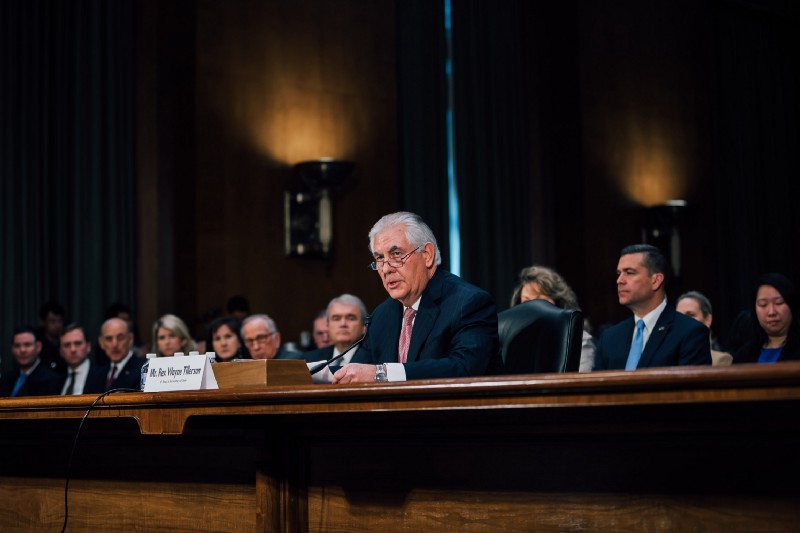
He stumbled and mumbled in a Texas drawl through hours of cringe-worthy hearings before the US Senate’s foreign relations committee.![]()
He refused to label Russian president Vladimir Putin a ‘war criminal,’ and he dissembled about human rights abuses when asked about the Philippines under Rodrigo Duterte or about Saudi Arabia. Moreover, at times, Tillerson seemed to distance himself from Trump when he failed to commit to pull out of Iran’s nuclear deal, and Marco Rubio, the Florida senator who lost the Republican nomination to Trump last year, lectured Tillerson on human rights in Russia, Syria and around the world.
Nevertheless, former ExxonMobil CEO Rex Tillerson easily won confirmation yesterday by the full Senate, and he will succeed John Kerry as the next US secretary of state, despite the earlier misgivings of Rubio and several other hawkish Republican senators.
Say what you want about Tillerson, he’s never — to my knowledge — joked about an impending US invasion with the sitting Mexican president into Mexico to get the ‘bad hombres’ or hung up on the Australian prime minister after a wholly unprofessional rant about winning the election and trying to welch out of a prior US agreement.
* * * * *
RELATED: Tillerson’s not a bad choice for State,
he’s just a bad choice for Trump’s administration
* * * * *
But perhaps the most interesting thing about Tillerson’s nomination was that US president Donald Trump ultimately selected Tillerson and not Lee Raymond, Tillerson’s predecessor as ExxonMobil CEO. As between the two, Raymond is far more ‘Trumpier.’ He routinely denied either that climate change is man-made or that climate change is, in fact, occurring. Raymond presided over the massive efforts after the 1989 Exxon Valdez oil spill to improve the company’s safety record, and he successfully merged his company with Mobil. But he routinely flouted SEC rules on counting oil reserves and he also presided over a human rights fiasco in Aceh, then a separatist province in Indonesia.
By all rights, Raymond was always the alpha male to Tillerson’s beta male. After taking over the reins of ExxonMobil in 2005, Tillerson promptly acknowledged that climate change is a real threat and, after the Democratic Party took control of both the US congress and the presidency in 2009, even advocated for a carbon tax (instead of the more complicated, if more popular cap-and-trade legislation).
There’s no doubt that Raymond is exactly the kind of personality that Trump respects, and Raymond — even, one suspects, at the age of 78 — would have gone into Foggy Bottom ready to disrupt. By contrast, Tillerson is a life-long Texan Boy Scout and quintessential company man who spent his entire four-decade career at Exxon. While there are real doubts about whether Tillerson will succeed, one of the biggest is whether he can shift, after so many years, to such a very different role and such a very different bureaucracy.
In a more ‘normal’ Republican administration, under Rubio or Jeb Bush or Scott Walker or John Kasich, Tillerson might be a refreshing choice at State. Instead, the Trump administration’s inexperience and Trump’s odd conciliatory relationship with Putin have only highlighted Tillerson’s own lack of diplomatic experience and Russia ties. More than any other administration in recent memory, the Trump administration is full of government outsiders with scant experience inside the executive branch. That’s true for Trump, but it is also true for the chief of staff Reince Preibus, for chief strategist Stephen Bannon, for national security adviser Mike Flynn. So another worry is Tillerson he might simply fade alongside so many other forceful personalities, including Trump himself, Flynn, Bannon and others.
That’s not to say Tillerson isn’t bright or capable. It’s clear, above all from Steve Coll’s indispensable 2012 book, Private Empire: ExxonMobil and American Power, just how knowledgeable and effective Tillerson was in negotiations around the world. At Exxon, Tillerson pursued a foreign policy designed to help his company’s interests and his shareholders, and that didn’t always line up with the interests of the US government’s foreign policy, most notably as his company chafed at economic sanctions in recent years against Russia. On at least two occasions, ExxonMobil got the better of Venezuela under Tillerson’s leadership, and Tillerson effectively sidelined the central Iraqi government in Baghdad to make a better deal with autonomous Kurdistan in the north. That’s above and beyond the more well-known ties between Tillerson and Putin over ExxonMobil’s Siberian oil deals, and navigating the longstanding relationships between his company and dictatorial oil-rich autocracies like Nigeria, Equatorial Guinea and Chad. (Coll’s book really is required reading for those who want to understand foreign policy in the Trump era).
Tillerson, it’s clear, knows his way around the international landscape — probably far more intimately than Trump himself, who has already gaffed his way across the globe in less than two weeks in the Oval Office. Continue reading The case for optimism in Tillerson’s State Department





